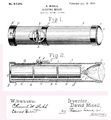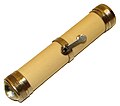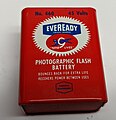Eveready Battery Company
| Company type | Subsidiary |
|---|---|
| Industry | Consumer goods |
| Founded | 1896 (as the American Electrical Novelty and Manufacturing Company) |
| Headquarters | St. Louis, Missouri, U.S. |
Key people | Alan Hoskins (CEO) |
| Products | Batteries |
| Parent | Energizer Holdings |
| Website | eveready |
Eveready Battery Company, Inc. is an American manufacturer of electric battery brands Eveready and Energizer, owned by Energizer Holdings. Its headquarters are located in St. Louis, Missouri.[1]
The predecessor company began in 1890 in New York and was renamed in 1905. Today, the company makes batteries in the United States and China and has production facilities around the world.
History

In 1896, Russian immigrant Conrad Hubert founded the American Electrical Novelty and Manufacturing Company to market battery powered devices.[2] On January 10, 1899, the company obtained U.S. Patent No. 617,592 (filed March 12, 1898) from David Misell, an inventor.[3] This "electric device" designed by Misell was powered by "D" batteries laid front-to-back in a paper tube with the light bulb and a rough brass reflector at the end.[4] Misell, the inventor of the tubular hand-held "electric device" (flashlight), assigned his invention over to the American Electrical Novelty and Manufacturing Company owned by Conrad Hubert.[3][5]
In 1905, Hubert changed the name again to The American Ever Ready Company, selling flashlights and batteries under the trademark Ever Ready.[6] In 1906 the British Ever Ready Electrical Company (BEREC) was formed for export of batteries; it became independent in 1914.[7][8] In 1907, Ever Ready announced AA dry cell, and in 1911 it developed AAA dry cell.[9][third-party source needed]
In 1914, The American Ever Ready Company became part of National Carbon Company. Hubert stayed on as the president. The trademark was shortened to Eveready.[2] Under National Carbon, the company continued to market various tubular flashlights, flask-shaped pocket lights, fountainpen flashlights, lighted clocks, lanterns, electric candles, cap and lapel lights, search lights, pistol lights, gas and range lighters, and tungsten batteries.[10] In 1917, National Carbon Company merged with Union Carbide to form the Union Carbide and Carbon Company.[11] From 1917 until 1921, Eveready used the trademark "DAYLO" for their flashlights and on their batteries. Into the 1930s, it sold "A," "B," and "C" radio batteries, Columbia Dry Batteries, and flashlight batteries.[12] B batteries were sold under the Layerbilt name.[13]
In 1937, a South African operation was established in Port Elizabeth.[14] By 1949, BEREC acquired the concern.[15]
In 1957, employees Lewis Urry, Paul Marsal, and Karl Kordesch invented a long-lasting alkaline battery using a zinc/manganese dioxide chemistry while working for Union Carbide's Cleveland plant.[16][17] The company did not aggressively market the invention, however, and instead continued to market the zinc–carbon battery. As a result, the company lost significant market share to Duracell.[18]
Union Carbide Kenya Limited., based in Kenya, was established in 1967 to manufacturer and market Eveready batteries in Africa. It was renamed to Eveready Batteries Kenya Limited in 1986 and to Eveready East Africa Limited in 2004.[19]
Prior to March 1, 1980, the company's alkaline battery had been called the Eveready Alkaline Battery (1959–1968), Eveready Alkaline Energizer (1968–1974) and Eveready Alkaline Power Cell (1974–February 29, 1980). On March 1, 1980, it was rebadged under its current name, Energizer.[20]
In 1986, Union Carbide sold its Battery Products Division to Ralston Purina Company for $1.4 billion. After the transfer, the division was named Eveready Battery Company, Inc., becoming a wholly owned subsidiary of Ralston Purina.[21] By the end of 1987, Eveready held 58-60% percent market share, but that number had fallen to 40-45% by 1989 thanks to competition from Duracell.[22][23] In December 1988, Eveready's European unit acquired Cofinea, a French company that made Wonder and Mazda batteries.[24]
Eveready announced its first lithium AA battery in 1988 and began selling it in December 1992.[25][26] The company introduced its first mercury-free Battery in 1990.[27]
In 1992, it bought the British Ever Ready Electrical Company (manufacturer of Gold Seal and Silver Seal batteries) from Hanson Trust,[28] bringing its former subsidiary back under common ownership. Hanson retained its South African division at the time but ultimately sold it to Duracell in 1996.[29][30]
By December 1998, Eveready's market share had fallen to 30% against Duracell's 50%.[31] In June 1999, Ralston Purina announced it would spin off the Eveready business.[32] By September, it was announced that Eveready would sell its rechargeable battery division, though it retained a minority stake.[33]
Ralston completed its spin off Eveready in April 2000. The business unit was renamed Energizer Holdings, Inc., with Eveready Battery Company, Inc continuing as a subsidiary.[34]
Facilities
The company's initial factory opened in the 1890s and was located near Edgewater Park in Cleveland, Ohio.[35] The manufacturing plant was closed in 1978 and all operations shut down in 1997.[36] The site was put up for sale in 1999[37] and later turned into the Battery Park housing development.[35]
Eveready inherited its Fremont, Ohio plant when National Carbon Company acquired the company in 1914. The facility produced hearing aid batteries, aluminum-air batteries, C and D zinc-carbon batteries, and six-inch dry cell batteries at various times. It was closed in March 1998 following the decline in demand for zinc-carbon batteries.[38]
Eveready opened a plant in Bennington, Vermont in 1942 and a facility in St. Albans in 1947. The St. Albans plant closed in 2013.[39] After nearly 80 years of operation, it was announced in October 2019 that the Bennington facility would close. Production operations moved to a new facility in Portage, Wisconsin.[40]
In 1967, Union Carbide opened an electrolytic manganese dioxide plant in Marietta, Ohio. Three ferromanganese-alloy furnace departments were sold in 1981. A fire in April 1987 kept the facility closed for over a year.[41]
In 1971, Eveready opened a facility in Maryville, Missouri. It was underwent five expansions from 1973 to 1997 before ultimately closing in 2013 due to a drop in demand of disposable batteries.[42]
The company also maintained facilities in Asheboro, North Carolina; Marietta, Ohio; and Westlake, Ohio.[43] The majority of batteries are made in China. There are also numerous production facilities outside the US.
Advertising
This section needs additional citations for verification. (July 2021) |
In the 1920s, the company sponsored The Eveready Hour on radio.[44]
In 1941, after the United States entered World War II, the slogan changed to "Change your batteries, get a nickel!" to encourage economic growth.
In the 1970s, actor Robert Conrad was the spokesman for Eveready Alkaline Power Cells, in which he compared his tough physique to the performance of the battery placed on his shoulder, and daring someone to knock it off.[45]
In the early 1980s, it utilized the slogan, "Energized, for life!", showing people using Energizers in everyday situations.[46][47]
In 1985, the company highlighted an advertising campaign best known for Mary Lou Retton averring: "It's supercharged!"[48]
In the late 1980s, there was an Australian advertising campaign featuring Mark 'Jacko' Jackson and his pitch line "Energizer! It'll surprise you! Oi!".[49]
Since 1988, the well-known Energizer Bunny has been featured in its television ads. The bunny was based on the similar Duracell Bunny. Initially, ads had the Energizer Bunny interrupting what seemed like other brands' commercials.[50] Later, the bunny would appear in competition with inferior rival battery Supervolt, which was based on Duracell. In 1991, it made the jump to print advertising.[51] Outside the United States and Canada, the company uses an anthropomorphic AA battery named Mr. Energizer as its mascot.[52][53][54]
Both the Eveready and Energizer marks are used under license by auto parts magnate Pep Boys for their in-house car batteries.[55] The Energizer logo used by Pep Boys is similar to the 1980s-era logo first used with the consumer dry cell batteries.
Both Eveready and Energizer are marketed as different brands in some markets in Asia. This has led to the availability of both "Eveready Gold" Alkaline batteries and Energizer Alkaline batteries on store shelves. However, both target different market segments and Eveready batteries tend to be marketed for lower end devices, while Energizer batteries are marketed for power-hungry devices and are priced accordingly.
Gallery
-
Misell's Patent 617,592
-
1899 Eveready flashlight
-
"9 Lives" logo
-
Eveready #742 1½ volt "A" battery with Fahnestock clip terminals for vacuum tube radios (1920s logo)
-
Eveready #460 battery, 45 Volts
See also
References
- ^ Eveready Battery Company, Inc. Privacy Policy Archived 2018-03-07 at the Wayback Machine, Retrieved 2010-10-30.
- ^ a b "American Ever Ready Company". The Collection of Historical Scientific Instruments. Retrieved 2024-11-06 – via Harvard University.
- ^ a b "Patent number: 617592 by David Misell". Retrieved 2013-09-30.
- ^ "History of Batteries (and other things)". Electropaedia. Mpoweruk.com. Archived from the original on October 3, 2017. Retrieved 2013-09-30.
- ^ "Flashlight Museum". Wordcraft.net. Retrieved 2013-09-30.
- ^ "Ever Ready Company | Science Museum Group Collection". Science Museum Group. Retrieved 2024-11-06.
- ^ "Ever-Ready". Rochester Avionics Archive. Retrieved 2024-11-06.
- ^ Bowen, David (1993-06-26). "Assault and battery: The fall of the Ever Ready empire: a classic tale". The Independent. Retrieved 2024-11-06.
- ^ "About Eveready". eveready.com. Retrieved 2022-04-08.
- ^ Eveready Flashlights. 1916 – via Internet Archive.
- ^ "Union Carbide Co". Syracuse University Libraries Digital Collections. Retrieved 2024-11-06.
- ^ National Carbon Company, Inc. 1930 – via Internet Archive.
- ^ "Eveready Flashlights and Batteries". 1931 – via Internet Archive.
- ^ "Eveready scoops Proudly South African Homegrown Award". Bizcommunity. July 13, 2007. Retrieved 2024-11-09.
- ^ "History of the Company". www.eveready.co.za. Retrieved 2024-11-09.
- ^ Baird, Gabriel (2011-08-03). "Thomas Edison provided Lew Urry spark of idea for better alkaline battery: Greater Cleveland Innovations". The Plain Dealer. Retrieved 2024-11-09 – via Cleveland.com.
- ^ "Dry cell - Patent US-2960558-A". PubChem. Retrieved 2024-11-09.
- ^ "History of Energizer Holdings, Inc. – FundingUniverse". www.fundinguniverse.com. Retrieved 2024-11-09.
- ^ "EVEREADY EAST AFRICA LIMITED" (PDF). Archived from the original (PDF) on October 26, 2016. Retrieved November 9, 2024.
- ^ "Manufactured Object, Torch 'Eveready' c1950, c1950". Victorian Collections. Retrieved 2024-11-09.
- ^ "Ralston Purina Buys Carbide Unit". The New York Times. July 1, 1986. Retrieved November 7, 2024.
- ^ Sims, Calvin (December 4, 1987). "Kraft Says It Will Sell Its Duracell Division". The New York Times. Retrieved November 7, 2024.
- ^ Foltz, Kim (October 23, 1989). "Amid TV's Ad Clutter, a Rabbit Runs Wild". The New York Times. Retrieved November 7, 2024.
- ^ "Unit of Eveready To Buy Cofinea". The New York Times. December 2, 1988. Retrieved November 7, 2024.
- ^ "Eveready Develops A Lithium Battery". The New York Times. September 30, 1988. Retrieved November 7, 2024.
- ^ Durniak, John (April 4, 1993). "Longer Drumbeats For Lithium Battery". The New York Times. Retrieved November 7, 2024.
- ^ "Eveready Battery Is Mercury Free". The New York Times. May 5, 1990. Retrieved November 7, 2024.
- ^ "Assault and battery: The fall of the Ever Ready empire". The Independent. London. 27 June 1993. Retrieved 2010-02-20.
- ^ "Hanson Sells Ever Ready". The New York Times. April 14, 1992. Retrieved November 7, 2024.
- ^ "Hanson Sells Plant In South Africa". The New York Times. April 17, 1996. Retrieved October 9, 2024.
- ^ Guart, Al (1999-05-11). "GUNNING FOR BUNNY DURACELL SUES OVER PINK HARE'S 'WHITE LIES'". New York Post. Retrieved 2024-11-09.
- ^ "RALSTON PURINA TO SPIN OFF BATTERY SUBSIDIARY". The New York Times. June 11, 1989. Retrieved November 7, 2024.
- ^ "RALSTON PURINA AGREES TO SELL BATTERY UNIT TO MOLTECH". The New York Times. September 29, 1999. Retrieved November 7, 2024.
- ^ "Ralston Purina completes Energizer spinoff". www.bizjournals.com. April 3, 2000. Retrieved 2024-11-08.
- ^ a b Raponi, Richard. "Battery Park - The Postindustrial Transformation of an Eveready Plant". Cleveland Historical. Retrieved 2024-11-09.
- ^ "Eveready Plant Pre-Demolition". Cleveland Historical. Retrieved 2024-11-09.
- ^ Bullard, Stan (September 13, 1999). "EVEREADY ENERGIZED TO SELL BUILDING: APARTMENTS POSSIBLE IN OLD BATTERY PLANT". Crain's Cleveland Business. Retrieved November 9, 2024.
- ^ "EVEREADY COMPANY". Rutherford B. Hayes Presidential Library & Museums. Retrieved 2024-11-10.
- ^ Niles, Hilary (2013-09-03). "St. Albans looks past this month's Energizer plant closing". VTDigger. Retrieved 2024-11-10.
- ^ Therrien, Jim (25 October 2019). "Officials poised to assist Energizer workers". The Bennington Banner. Retrieved 2019-10-27.
- ^ "HHE Report No. HETA-92-0415-2502, Eveready Battery Company, Marietta, Ohio" (PDF). Centers for Disease Control and Prevention. April 1995. Retrieved November 9, 2024.
- ^ Scherer, Ray (2012-11-22). "Long-term consumer battery market a factor in Energizer decision". St Joseph News-Press. Retrieved 2024-11-10.
- ^ Where we work Archived 2010-10-08 at the Wayback Machine, Energizer website. Retrieved 2010-10-30.
- ^ Dunning, John (1998-05-07). On the Air: The Encyclopedia of Old-Time Radio. Oxford University Press, USA. ISBN 978-0-19-507678-3.
- ^ Dagan, Carmel (2020-02-08). "Robert Conrad, Star of TV's 'The Wild Wild West,' Dies at 84". Variety. Retrieved 2024-11-10.
- ^ VCR Time Machine (2022-06-05). Energizer Battery Ad, 1983 "Energized For Life". Retrieved 2024-11-10 – via YouTube.
- ^ 1980s Commercials (2021-04-29). Energizer "Energized for Life" Battery Commercial - 1982. Retrieved 2024-11-10 – via YouTube.
{{cite AV media}}: CS1 maint: numeric names: authors list (link) - ^ RetroTy: The Pulse of Nostalgia (2013-03-22). 1985 - Energizer - Mary Lou Retton Supercharged. Retrieved 2024-11-10 – via YouTube.
- ^ "Mark 'Jacko' Jackson - Biography". IMDb. Retrieved 2022-04-08.
- ^ Foltz, Kim (October 23, 1989). "Amid TV's Ad Clutter, a Rabbit Runs Wild". The New York Times. Retrieved November 8, 2024.
- ^ Stuart, Elliott (November 25, 1991). "The Energizer Bunny Is Jumping Into Print". The New York Times. Retrieved November 7, 2024.
- ^ Lim, Shawn (June 20, 2019). "Energizer gives mascot a makeover in first rebrand since 2008". The Drum. Retrieved 2024-11-10.
- ^ "Mr. Energizer®". EU. Retrieved 2024-11-10.
- ^ "Mr. Energizer®". Energizer-Australia. Retrieved 2024-11-10.
- ^ "Pep Boys Offers ENERGIZER Automotive Batteries with Lifecycle Technology". June 4, 2001. Archived from the original on January 10, 2009.





